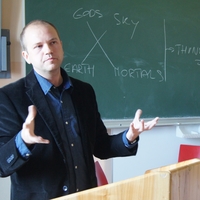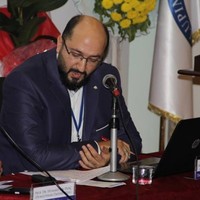
Saša Horvat
Sasa Horvat
less
Related Authors
Piotr Roszak
Nicolaus Copernicus University
selami Erdoğan
Dumlupinar University
Safer Grbic
University of Zagreb, Faculty of Humanities and Social Sciences [Filozofski fakultet]
Mihaela Kesić
Sveučilište Sjever
InterestsView All (13)









Uploads
Papers by Saša Horvat
the subtitle of this conference, inspired by Paul Simon’s song »Bridge Over Troubled Water.«
Just as the core idea of the interdisciplinary »Rijeka Scientific Bridges« conference lies in the concept of bridges connecting separate shores, this conference will connect neuroscientists, psychologists, theologians, and philosophers in
the field of neuroscience of religion.
While we hope the conference will move at a more dynamic pace than the mentioned song, the presentations aim to highlight the achievements and opportunities for advancement in this young discipline.
The ninth edition of »Rijeka Scientific Bridges« is a unique scientific event that will bring together local experts from various scientific fields, and international guests from the United States, Poland, Germany, Austria, United Kingdom, Italy, Switzerland, Finland, and the Netherlands.
The symposium is also part of the international project »Philosophy of (Neuro)Science and Theology: Understanding Data, Methods, and Results of Neuroscience of Religion,« led by Assoc. Prof. Saša Horvat, Ph.D., and is financially supported by the SET Foundations and the John Templeton Foundation.
The purpose of the symposium is to facilitate a meeting of experts from different scientific fields. These individuals, cognizant of the methodological limitations inherent in their respective approaches, are prepared for a transdisciplinary polylogue. The symposium seeks to showcase that even seemingly insurmountable
obstacles can be overcome with a commitment to the pursuit of truth. It
acknowledges the possibility of not finding a definitive answer or consensus, a distinctive trait of intellectual honesty; honesty that does not signify surrender but rather encourages even greater perseverance in research.
Keywords: naturalism, reductionism, science-religion, pain, suffering, neuroscience, theodicy, providence, meaning, theology of nature, philosophy of science, body and pain.
for identity and its pastoral challenges” are a collection of works created
by members of the international scientific Polish-Croatian Summer
School on John Paul II and his legacy, likewise titled – “The search
for identity and its pastoral challenges”.
The Polish – Croatian Summer School, held from July 15 to 22,
2018 in Toruń, Poland – was organized by the Faculty of Theology at
the University of Nicolaus Copernicus (Toruń, Poland) and Theology
in Rijeka, an extension centre of the Catholic Faculty of Theology at
the University of Zagreb in Croatia...
The last few decades have been marked by numerous scientific studies and projects on human religiosity in the interdisciplinary area shared by neuroscience, cognitive science and evolutionary science. The question arises can empirical research contribute to a better understanding of the phenomenon of religiosity in the field of theology and philosophy?
If the answer is negative, then we need to see what the problems are. If the answer is positive, then we need to see what the perspectives of joint research are. The lecture will briefly analyse the main hypotheses and methods of the above-mentioned sciences, after which we will try to understand whether these insights can be useful to theology and philosophy and what further development we can expect in the near future.
disagreements have a great influence not only on the academic community and scientists, but also in the public sphere. The reason for disagreement could be found in different interpretations and understanding of the fundamental human capabilities: faith and reason. Neuroscientific findings brought new perspectives and enabled new ways of understanding the human being and his capabilities, deeply
challenging philosophical and theological insights. Though 20 years have passed since the publication of „Fides et ratio“ by Saint John Paul II., the encyclical continues to provide concrete and sound principles of understanding the relationship between faith and reason, which can be used to enable and strengthen the necessary interdisciplinary dialogue. In the first part of the lecture, we will try to highlight different approaches, methods, and boundaries in an attempt to understand the human being. In the second part we will try to provide arguments that, despite the differences, the dialogue is still possible.
One of the dangers that threatens vitality of philosophy and theology is the prejudice that certain topics are self-understandable once and for all. This implies a clear insight into the emergence, development and final clarification of the topic into the current structure that makes it then accessible for application. This is also sometimes at stake with the question of analogy, which is then handled in an unquestioned manner, enabling a shortcut way to operationalization of this fundamental way of communicating the relation between God and creatures...
https://laboratoriumwolnosci.pl/en/call-for-paper-en/
---
Dear Colleagues,
What were the origins of life and of the human species? Did they require a direct divine intervention? Or maybe natural conditions and causes were sufficient for these major transitions in the history and evolution of the universe to occur? Was the created order always accompanied by the possibility or even inevitability of natural (physical) evil? And what about the experience of suffering, pain, and evil of human beings – in the face of the Christian conviction about the infinite goodness and power of God the Creator?
Answers to these questions have always sought to follow and welcome insights from various disciplines of human knowledge. However, with the increasing importance and growing challenges coming from empirical sciences, and evolutionary theories in particular, theological reflections on the origins and theodicy seem to have retreated to a more cautious and reserved position. One might argue they approach contemporary science from a secure, more metaphysical point of view. Sometimes they may even be at danger of holding too tightly to overly dogmatic philosophical-theological presuppositions and conclusions, regardless of both inspirations and difficulties raised by the contemporary scientific view of the reality.
This special issue titled “Science-Engaged Approach to Origins and Theodicy: Old Questions, New Horizons” seeks to encourage authors to make a more direct use of scientific knowledge in addressing some of the old and new questions concerning the origins and theodicy. This implies the use of scientific knowledge as an auxiliary tool that can contribute to a better understanding of certain theological topics. Can evolutionary anthropology help us to understand better the original state of first humans? Should population genetics have a decisive impact on mono- versus -polygenism debate? Can evolutionary medical understanding of pain be helpful in addressing the topic of pain in theodicy? Can psychological insights on suffering be of help when we think about suffering of humans? How can we use insights from cognitive science in the study of our behavior and moral development?
Following in the footsteps of the emerging science-engaged theology initiative, we are trying to move away from the popular methodology applied in science/theology dialogue, where philosophical-theological discourse is developed in parallel to science, with rather unique and rare cases of a true intersection. A par excellence example of what we have in mind is St. Thomas Aquinas, who integrated into his reflection the scientific knowledge of his time, thinking about theology a as supervisor who cares and reflects on the content and direction of all divisions of knowledge, for the good of humankind and its relationship with God.
All contributions that seek to reflect on various aspects of origins and theodicy in more direct reference to scientific knowledge are welcomed.
Dr. Piotr Roszak
Dr. Saša Horvat
Dr. Mariusz Tabaczek
Guest Editors
Manuscript Submission Information
Manuscripts should be submitted online at www.mdpi.com by registering and logging in to this website. Once you are registered, click here to go to the submission form. Manuscripts can be submitted until the deadline. All submissions that pass pre-check are peer-reviewed. Accepted papers will be published continuously in the journal (as soon as accepted) and will be listed together on the special issue website. Research articles, review articles as well as short communications are invited. For planned papers, a title and short abstract (about 100 words) can be sent to the Editorial Office for announcement on this website.
Submitted manuscripts should not have been published previously, nor be under consideration for publication elsewhere (except conference proceedings papers). All manuscripts are thoroughly refereed through a double-blind peer-review process. A guide for authors and other relevant information for submission of manuscripts is available on the Instructions for Authors page. Religions is an international peer-reviewed open access monthly journal published by MDPI.
Please visit the Instructions for Authors page before submitting a manuscript. The Article Processing Charge (APC) for publication in this open access journal is 1200 CHF (Swiss Francs). Submitted papers should be well formatted and use good English. Authors may use MDPI's English editing service prior to publication or during author revisions.